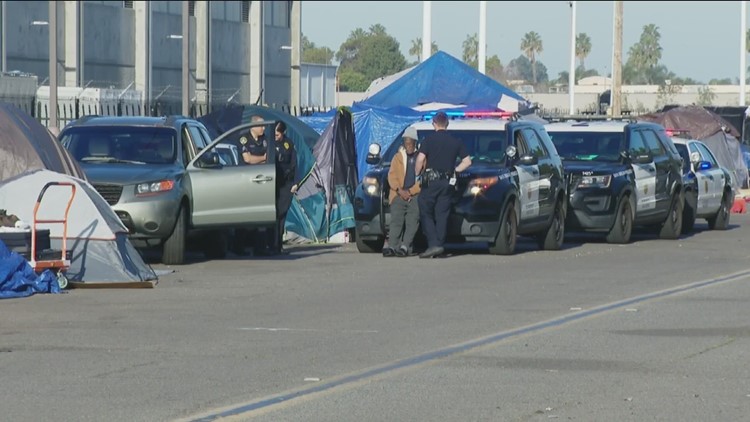SAN DIEGO — In 2019, San Diego city leaders, the county's Regional Task Force on Homelessness, as well as the Housing Commission joined homeless service providers to formulate a comprehensive action plan to address the rising number of San Diego's homeless population.
Through a series of initiatives, the plan's authors believed that the city could reduce the number of people living on the streets and in emergency shelters by 50%.
The plan, says Ann Oliva who co-wrote the strategy, was abandoned.
Instead, more than three years after the action plan was presented to the city, San Diego's elected officials opted to take more immediate action, banning homeless people from parks, near schools and shelters and other areas, as well as outlawing tents on public property when shelter beds are available. The decision to pass the Unsafe Camping Ordinance happened late the night of Tuesday, June 13 during a 10-hour council meeting. More than 200 people spoke during the public comment portion and the San Diego City Council closed the night with a 5-4 in favor of the encampment ban.
As for the now-abandoned community action plan, Oliva, who is now the CEO of the National Alliance to End Homelessness, says portions of the plan including centralizing homeless services, rapid rehousing programs, and other initiatives were in the works until COVID hit and then later came a change at San Diego City Hall.
"The plan was being implemented, even though there were some roadblocks in the way," said Oliva. "Of course, there was a change in the mayor's office. And I don't think the action plan was viewed in the same way after that."
Oliva believes the city's decision with the camping ban will only make matters worse for those living on the streets or in temporary shelters.
"Criminalization is an incredibly harmful practice, and it doesn't actually end homelessness," Oliva told CBS 8. "Officials who say otherwise are being disingenuous. Criminalization removes people from public view, but it doesn't end their homelessness or any of the underlying issues related to it. What it really does is harm the people who are subjected to it. It makes the jobs of homeless service providers more difficult because people often lose connection to their service provider, they lose documents, and they lose trust in the system when they are forced to move."
But that is not all, says Oliva.
It also jeopardizes millions of dollars that San Diego receives in Housing and Urban Development (HUD) funds.
Oliva says that cities and counties throughout the country apply for federal homeless funds each year. The process is extremely competitive and funding is awarded on a point-based system.
"HUD is quite specific in terms of how many points are available for different kinds of things," said Oliva. "When you have this type of approach, I think it's definitely going to impact San Diego's ability to be competitive against communities that are not implementing criminalization practices."
Added Oliva, "When you have a shelter-driven policy, everybody who's in a shelter bed is still counted as experiencing homelessness, while people in permanent housing are no longer experiencing homelessness. So for jurisdictions that focus on housing, their numbers change in a positive way. That means that this type of ordinance is going to set San Diego back in terms of being competitive for that national pot of money."
But San Diego Mayor Gloria says action is needed now.
"When taken all together what we will have is more tools in the toolbox to address the health and safety conditions on the streets of San Diego," Mayor Gloria said. "The vast majority of San Diegans believe encampments are bad. Surprisingly there are some people that have no problems with encampments and seemingly support them. I don't."
For Oliva of the National Alliance to End Homelessness, San Diego is joining a long list of other cities across the state and the nation in focusing their efforts on enforcement.
"We're seeing trends nationally around criminalization and enforcement. It seems like a political response to a problem rather than a strategic response," said Oliva. "Homelessness has been caught up in a number of political fights in a way that earlier in my career was not the case, it is become a more partisan issue, although in San Diego, obviously, the increase in unsheltered homelessness has put pressure on elected leaders to act, even if that action is known to be ineffective and not going to solve the problem."



